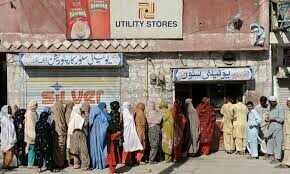Utility Stores Corporation to be ‘restructured’, not shut down, says minister – Pakistan


LAHORE: As employees of the Utility Stores Corporation (USC) staged protests in several parts of the country, Minister for Industries and Production Rana Tanveer Hussain on Saturday dismissed the impression that the utility stores are being closed, insisting that the government plans to “restructure” the organisation.
“The impression that utility stores are being shut down is incorrect. The USC is being restructured to ensure that only deserving people receive relief and price discounts on essential food items and groceries,” the minister stated while speaking to the media after inaugurating the 9th Colour and Chem Expo at the Lahore International Expo Centre.
The government was already providing subsidies to the needy through the Baitul Maal and Benazir Income Support Programme, Mr Hussian said, stressing that subsidy misuse has been a persistent issue in the country.
In Muzaffargarh, USC staff held a protest against the proposed closure of the organisation. Several employees gathered outside the press club, chanting slogans against the government’s move, which they said would leave thousands jobless. They warned of launching a larger movement if the government does not reverse its decision.
Similar protests were reported in Jalalpur Pirwala, Jahanian and Chishtian.
Mr Hussain’s remarks came a day after the federal government announced its intention to wind up the USC, exploring alternative measures, potentially including cash transfers to the needy.
The move is part of the rightsizing of federal ministries and institutions running under those ministries.
The USC, a state-owned enterprise, operates over 4,000 stores nationwide, providing basic commodities to the public at subsidised rates. It is among the federal entities listed for privatisation in the first phase of the government’s privatisation strategy.
The potential closure of utility stores was also raised during the Senate Standing Committee on Industries and Production meeting on Friday. In response, Industries and Production Secretary Saif Anjum said the matter was under discussion with the cabinet, as the government had yet to decide on its complete closure or devolution to the provinces.
The ministry has been given two weeks, as directed by the prime minister, to devise alternative arrangements following the closure of the utility stores.
The USC was established in July 1971 by acquiring 20 retail outlets from the Staff Welfare Organisation. It has since undergone various stages of expansion and reorganisation to its current state.
Lahore expo
More than 300 exhibitors are showcasing their products at the 9th Colour and Chem Expo.
The event features participants from the dyes, chemicals and allied industries, including representatives from China, Malaysia, Turkiye and Iran. The exhibition is organised by Event and Conference International, Rainbow Group, and the Punjab Dyes and Chemicals Merchants Association.
During the event, Mr Hussain acknowledged that the exports of India, Bangladesh and other developing countries far exceed those of Pakistan. He noted that Prime Minister Shehbaz Sharif has set a target to double the country’s exports within three years.
When asked about the heavy taxes on the tractor industry, Mr Hussain said he had already discussed the issue with the finance minister and the Federal Board of Revenue following several meetings with the tractor association and hoped for a positive outcome in the coming days. “Farmers and agriculture are our priority,” he said.
To another question, Mr Hussain said that political unrest began in 2014 and escalated when the founder of PTI vowed to become “more dangerous” if removed from power.
He suggested that the current political turbulence is a result of this conspiracy and urged institutions and the nation to address the instability, now that the “main conspirator” has been apprehended.
He also stressed the need to boost Pakistan’s exports, noting that PM Shehbaz is working on reviving the country’s economy. “We need to increase the production of raw materials, especially in the dyes, chemicals and allied industries, to reduce our reliance on imports,” he said, pointing out that the country’s import bill is more than double its exports, which stand at $30 billion a year.
Published in Dawn, August 25th, 2024
Source link